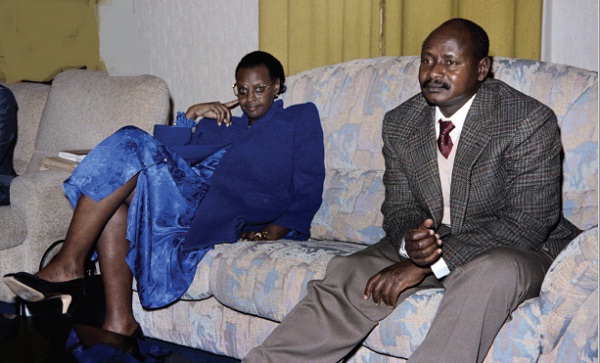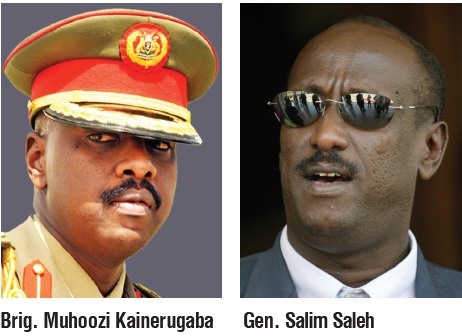He speculates that, at the right moment, Museveni will probably sit with his NRM-insiders and others in the country and decide and adds, however, that Uganda needs to build a well-defined and efficient mechanism to enable regular transfer of power not just at party level but at national level.
Commentators who toe the line of orderly succession within NRM often speak of First Lady Janet Museveni as a major power player in the succession story. She is said to be the matriarch of a powerful behind the scenes group that is increasingly becoming the real power behind Museveni’s throne.
Faced with an opponent they cannot defeat at home, Museveni’s opponents often resort to solutions from the international community.
Lukwago, for example, believes the international stage will in the next five years prove a puzzling arena for Museveni to navigate with the likely entry of some new players in the American White House. Lukwago says it is not clear how Museveni will do business with America if Republican contender Donald Trump wins the presidency.
“Trump is a loose cannon; he is someone who may remove gloves and break away from the orthodox way of doing things which may change the situation for some geo-political players like Museveni,” he told The Independent.
Lukwago steered clear of discussing the implications for Museveni if it is Democratic contender Hillary Clinton in the White House next January. Clinton has done business with Museveni before and could be more accommodating. But Lukwago makes another important point about Museveni’s fading muscle-man role for America in the Great Lakes region.
In March, U.S. Ambassador to the UN, Samantha Power while at a UN Security Council Meeting, described Museveni as a threat to Uganda’s stability for his long stay in power. A few weeks later on April 8, The Washington Post in an editorial advised the U.S. government to revisit its approach towards Uganda writing that: “lavish security assistance from the United States may be helping to enable an environment of increasing repression in Uganda, and sending the message to other African nations that trampling on rights is permissible so long as the country remains a U.S. counterterrorism ally.”
To this Museveni bashing abroad, Lord Mayor Lukwago adds a regional dimension.
The dust is settling in South Sudan and our role in Somalia is being evaluated a lot,” he says, “Western powers may ditch Museveni because his relevance has always been about conflicts but that is not sustainable”. The UPDF commands acclaim on the continent for its missions in Central African Republic, (CAR), Somalia and South Sudan.
Even if the UPDF, with American support withdrawn as Lukwago predicts, fails to find work abroad, it will have enough at home. Soon after the Feb.18 general elections, Museveni – with an AK47 slung over his shoulder – was seen leading platoons of the UPDF in quelling unrest that erupted in the western border region of the Rwenzori that left over 50 civilians dead. It is not clear how long Museveni can keep jumping over ravines, dodging bullets, and leading his army from the front. Like his Zimbabwean counterpart, Robert Mugabe; Museveni could still be president when he is 90 years old. Mugabe, however, cannot go up or down a stair without help.
Family politics
With the army remaining key to Museveni’s consolidation of his grip on power, his son, Brig. Muhoozi Kainerugaba, who commands the elite Special Forces Group under which is the Presidential Guard Brigade, will have to play a stronger frontal role. Although Muhoozi was a 12-year old when his father took power in 1986, he will be a greying 49-year old in 2021 and will – perhaps – have dreams of his own. Museveni’s other point man in the army, his younger brother, Gen. Caleb Akandwanaho aka Salim Saleh is now 56-years old. Saleh has cultivated an enigmatic personality with a stealth knack of popping up wherever his brother posts him.
Gen. David Sejusa insists Museveni is plotting to have his son, Brig. Muhoozi, succeed him. Sejusa even claimed that Museveni had hatched a plot to eliminate all opposition to Muhoozi’s succession
If Salim Saleh, Muhoozi, and Janet Museveni move closer to the centre in the next government, some prominent personalities today might have to step back. One of the most prominent is the Inspector General of Police (IGP), Kale Kayihura. The IGP is a brainy, tenacious, hardnosed officer who has encapsulated his job into a single mission: the preservation of Museveni in power. To achieve that, Kayihura has consolidated under his power all the security agencies and emerged as the third most powerful person in the country after Museveni and Janet. He has used that power to ensure that opposition leader and former FDC presidential candidate Kizza Besigye does not breathe.
Although Salim Saleh, Muhoozi, and Janet Museveni might also aim to preserve Museveni in power, they might be more comfortable working with another person other than Kayihura to ensure that. Their choice might be Lt. Gen. (Retired) Henry Tumukunde. As brainy and hardened as Kayihura, Tumukunde wields more powerful family connections to the centre of power. What is not clear is if he has the organisational ability to cope with the demands of keeping the myriad opponents to Museveni in check.

Already, Besigye has drawn the battle lines by insisting that Museveni is not a rightfully elected president and, together with other FDC diehards, has vowed to maintain a 24/7 defiance campaign. With Besigye making persistent demands for an international audit of the 2016 presidential elections, the stage seems to be set for more battles.
Besigye might not succeed in removing Museveni from power through the defiance campaign, but as police continue to hold him under virtual house arrest in his home, teargas him and his supporters whenever he ventures out, and to arrest, beat-up, and torture any perceived defiance campaign supporters, a strong tide will be building against Museveni’s regime.
Kampala City has become a battleground of security forces and opposition stalwarts over protests, prayer meetings and black Thursday activists. The government has banned media coverage of defiance activities, arrested priests, and taken refuge behind dubious court rulings by cadre judges.
Opposition politicians like Mathias Mpuuga (MP Masaka Municipality) are predicting that the tension could spill over into parliament in the next term. Mpuuga is unhappy that Museveni, using his NRM party majority, has captured parliament and muzzled its oversight role.
“Museveni does not even use it to serve party interest but personal interests,” Mpuga says. He says Museveni’s approach makes clashes between the two institutions almost inevitable. The MPs threat not to pass the budget(although they later budged) if the President does not assent to the Income Tax law they amended barring taxing of their allowances is the latest standoff.
In spite of the show of force, analysts say the government has boxed itself into a tight corner. The constant smell of teargas, long queues of armed patrols, security checkpoints, and impromptu military camps have created a city under siege. They give the country a bad image abroad. It is not clear what Tumukunde would do differently if he replaces Kayihura at the helm of security organisations.
Golooba is among those who believe the political tension is hurtful for Uganda.
“Museveni needs to work with other actors to resolve this standoff between NRM and the opposition; this is not in the interest of the country at all. The constant contestations have bedevilled the country,” he told The Independent.

The independent researcher says the anger directed at Museveni might, in fact, represent a protest against the government’s failure to improve service delivery. He says there is widespread consensus that the government has done badly on health and education.
“Museveni needs to refocus on the Vision 2040 goals,” Golooba says, “I am not sure he will achieve them but there needs to be serious effort on implementing some of those projects.”
 The Independent Uganda: You get the Truth we Pay the Price
The Independent Uganda: You get the Truth we Pay the Price



What if these assumptions come pass and President Museveni navigates around them.
Do Ugandans have the requisite steel in the right quantities and quality to create presumed raffles.
What if the economy improved and corruption is dealt with
Do the 60% in the village care what we are talking about to contribute
All am asking and many other questions is what are the counter arguments.